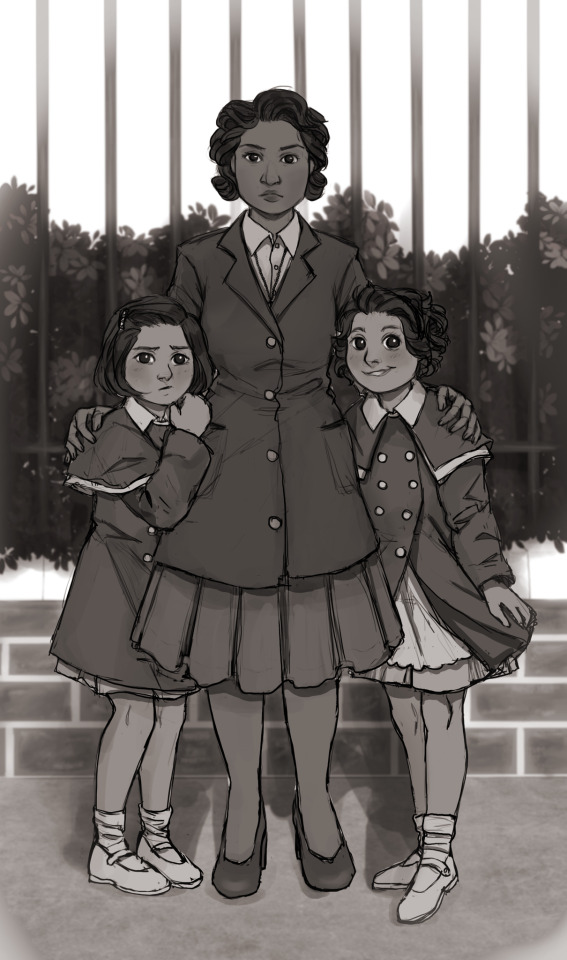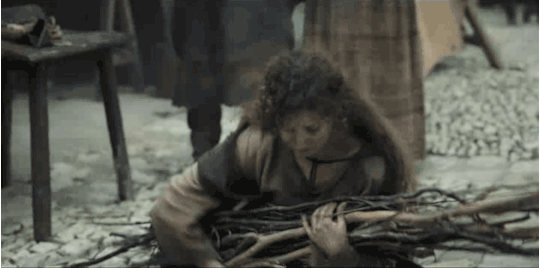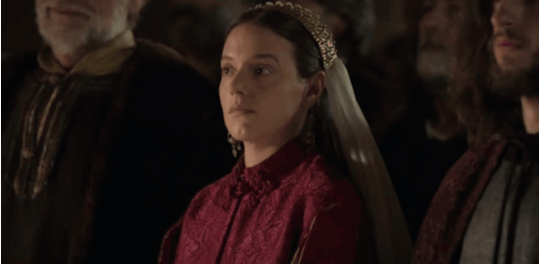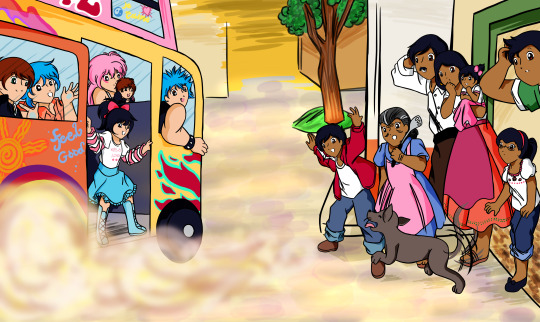#Elena rivera
Text



Elena Rivera x Alma Madrigal
33 notes
·
View notes
Text
You know, the Rivera family is probably Catholic.
Mexico is a majority Catholic country, and while obviously that doesn't mean everyone is Catholic, within the movie itself, you see Santa Cecilia has crosses everywhere, Coco was keeping her father's letters and picture inside what looks like a prayer book (maybe she used to pray for him to come back 💔), and Elena crosses herself after breaking Miguel's guitar.
Anyway, not that I actually know much about Catholicism, but I imagine Miguel going to confession a couple of days after the movie:
Miguel: So I had a big fight with my family and I told them I didn't want to be part of them and that I didn't care if I was on an ofrenda and I ran away and I was gone the whole night and they were all really worried about me and I went to play in the talent show even though my family didn't let so then I stole a guitar and my family thinks that's what I'm here for but really it wasn't stealing because it belonged to my great-great-grandfather so really it should've been ours but I didn't know that when I took it and I can't tell you how I know that. Also I broke into a tomb.
The poor priest, who is used to Miguel confessing things like "I snuck away to the plaza and listened to some mariachis. Then Abuelita smacked them with her chancla. Why isn't she here for that?" and other such music-related indiscretions: ...What?
(Abuelita does go to confession for losing her temper and using her chancla, but she admits that she doesn't feel very repentant in some cases. Those no-good mariachis deserved what they got!)
#coco#pixar coco#coco pixar#coco the movie#miguel rivera#coco 2017#abuelita elena#elena rivera#abuelita rivera#catholiscism#catholic riveras
98 notes
·
View notes
Text
Life’s a Witch
@hp-12monthsofmagic

María Soledad Rivera Santos and her twin daughters Elena (left) and Lidia (right), circa 1955.
A small tribute to Freyja’s grandmother who, when life gave her lemons, robbed and cursed the family she worked for and escaped to the UK alone.
Maria Soledad, better known as Marisol, was well aware of just how much of a bitch life could be. Despite being born with magical abilities, she was never formally educated on how to perform magic. From age 14, she worked as a domestic servant to a Spanish pureblood family. She befriended the youngest son, Luis Ángel, who over the course of several years tried to teach her some magic from his lessons and textbooks.
She worked for the family for 7 years, the last few of which she’d been in a secret relationship with Luis Ángel. While she hadn’t expected outpourings of joy from an unplanned pregnancy, she didn’t expect to be utterly betrayed by her lover. When his family found out about the relationship and resulting “little accident”, they accused her of bewitching him, hoodwinking him to succumb to her will. And what did he do? Agree with them. In the end, she had nobody to turn to for help.
Now she didn’t have a wand. Never owned one, tried one a few times with disastrous results. But what she did have was an extraordinary ability for wandless hexes and curses. So she put the house under a short-term sleeping spell, cleaned their house out of their most valuable treasures, cursed them for good measure, and ran away. She knew that escaping to a foreign country where she knew next to nothing about the culture and language was a risky move, but she also knew that if it meant her children would have a better life and education than she did, she would do it a million times over.
Fast forward 10 years, she had near-fluency in English, regular employment, a safe secluded home in Skye, two healthy daughters, and an overwhelming sense of pride and satisfaction. Life hadn’t been without its struggles, it was indeed a bitch — but it hadn’t counted on this witch.
#hogwarts mystery#hp12mom#hp-12monthsofmagic#i can’t ever remember if i gave her a surname(s) so now this is it i guess#marisol rivera santos#elena rivera#lidia rivera
107 notes
·
View notes
Text
we're happy here..
(my edit)
#coco#miguel rivera#de la cruz#coco 2017#2017#coco rivera#elena rivera#ernesto de la cruz#héctor rivera#imelda rivera#frida kahlo#happy house#my edit#my edits
17 notes
·
View notes
Text
abuelo
elena is ten and alone, cursed and sitting on a bench alive in the land of the dead. how she got there isn’t important: what is important is this.
she is brought quickly, swiftly, to the department of family reunions, thick hair tied into pigtails with soft purple ribbons, the same colour as her abuela’s dress.
and she gets asked the rather simple question: “who is your family, here in the land of the dead?”
and elena, guileless and brave and fierce but still ultimately ten, answers, carelessly: “my abuelo.”
you see - you see, elena’s abuelo on her papá’s side had died just that year. elena doesn’t think about her other abuelo - in fact, she doesn’t consider him much of one at all, just that dastardly husband of the best abuela in the world -
but she does say abuelo, and she does say mine, and well. nobody has ever dared accuse the department of family reunions of not keeping meticulous records.
so that brings us back to the here and now: a little girl with purple ribbons in a waiting room in the land of the dead, and a burgeoning argument outside.
no one was there with elena except one staff member, and well. no freshly-minted staff member would be prepared for this .
“héctor!” and elena perks up, even though the voice is angry, even though she is a little confused, because: that’s her abuelo! she has missed him so much. “what are you doing here?”
papá alberto says his name like a curse.
“I don’t know,” someone else says, someone elena does not know, another man. younger, less certain. “I - well. I try to keep the department on my good side. but.” a nervous laugh. “how’s the family?”
papá alberto remains quiet for a few solid beats. “good. but why would you care?”
a nervous chuckle. “well. I want to hear about how things have been going in santa cecilia.”
a strained, heavy silence pierces through the air.
elena cocks her head, curious about this stranger - this héctor - who angers her papá alberto. adults never tell her the full story.
“how’s mi familia ?” the other man - héctor asks - his voice now painfully desperate. “I have never been able to cross over - ernesto won’t talk to me - I just.”
something cracks.
“I just want to know,” héctor finishes, soft and unsure.
"you just want to know?" papá alberto asks, mocks. "it's decades too late for that, héctor!"
"you think I haven't tried ?" héctor asks, this stranger making her abuelo upset.
"no one has seen hair or hide of you since 1921!"
elena tilts her head to the side. who is this man, and how does he know her papá alberto? she wants to tell him off, to stop making papá alberto upset, like mamá imelda would, wagging her shoe fiercely.
"that's when I died!" héctor says, anguished.
a pause: one, two, three. elena leans forward.
the next time papá alberto speaks, it is a little softer. “you died in 1921?”
“did you not know?” another pause, this time more pained. “does no one in santa cecilia know?”
elena leans forward, intrigued. nothing much happens in santa cecilia - day by day life comes and goes, and that estupido músico is from it, the one all the tourists fawn over, but not much else.
papá alberto’s silence is enough answer.
another question, softer and more uncertain. “does imelda not know?”
“your wife is included in everyone,” papá alberto says, shortly. “I did not know you were dead before tonight.”
there is a loose connection forming, between héctor and abuelita, mamá imelda - but a wife from santa cecilia named imelda is not conclusive evidence in elena’s mind, a mere curiosity. she is ten years old and alive in the land of the dead, after all, and her mamá imelda's husband has long been a non-entity in her head. she is not scared, certain in her papá alberto’s ability to fix everything.
it is one of the most certain things in elena’s life: that her mamá’s papá is a non-entity, a scoundrel and a liar, who left without a word - not someone who died.
right?
héctor speaks next, cheerful in a way that sounds forced. “foolish me, thinking my best friend would tell my wife I died! what’s next, did he also frame me for robbery when I was dead and buried?”
“ah,” papá alberto says, stumbling a little, “not that I’m aware of? but everyone does think - well.”
"I gathered, gracias." the faux cheerfulness drops. “that explains a lot, alberto. I died! I didn't -”
a repetition, a yearning, like he is trying to reach between the land of the dead and the land of living and tell people the truth, tell his wife the truth.
it will be scandalous news in santa cecilia, that’s for certain.
(elena still does not make the connection. why would she? she has never known her mamá’s papá name, knows nothing more about him than that he was a good-for-nothing walkaway músico.)
(that’s all about to change.)
“I know,” papá alberto says, a little faintly. “you never seemed the sort to - well. you dying makes more sense. we’ll discuss that later. we have more pressing matters to attend to.”
“of course,” héctor replies, smoothly. “did the department call you here too?”
it looks like they have stopped fighting and that elena is going to get her blessing and going to give her papá alberto one big hug and then go back home, with a secret to tell the whole town.
“the reason the department called me,” papá alberto says, slowly, “is that my granddaughter - she’s only ten - got herself cursed and needs my blessing to return to the land of the living, or so I have been told.”
“oh, poor chamaca !” héctor sounds genuinely troubled. “well, I shouldn’t hold you any longer, thanks for telling me my family doesn’t know that I’m dead!”
a clatter of feet, and elena looks towards the door, but it still doesn’t open, not yet.
“wait, héctor. I know why they called you,” papá alberto says, before stopping.
he never hesitates.
“she’s your granddaughter, too.”
34 notes
·
View notes
Text
Miguel Rivera becomes the first Rivera to turn down tequila, the fifteen-year-old knocking the offered shot out of his father's hand and onto the ground.
He looked horrified at the drink, and the adults crowded around him asked him what was wrong.
So he tells them of the Día de los Muertos he'd gone missing and where he had actually gone. Of course, at first, none of them want to believe his tale as he talks, hands waving as he describes the day from start to end, but the dread starts sinking in part way through.
It explained why Miguel never went on the roof again after returning, the teen trembling now when asked to climb a ladder or somewhere high. How he had come back after his disappearance to sing a song to Mamá Coco that only she and her papá had ever sung together, despite not knowing a single thing about the man. It had been three days after that Miguel was found throwing his de la Cruz merchandise into the firepit the family had, the twelve-year-old refusing to speak as he tore posters and muttered curses his abuelita boxed the back of his head for. Any mention of the man as the family slowly came to grips with the infamous music ban finally being lifted would instantly sour his mood, going so far as to throw a record Abel found secondhand into the trash with a look of utter hatred. It also explained that when Miguel wasn't in school, he was diving headfirst into research, the proof Mamá Coco had saved instantly, sparking interest from historical researchers worldwide. It didn't take long for the truth of de la Cruz's theft to become public, and while the world raged, Miguel spent time with historians who flew out to Santa Cecilia going over all inn records from 1921 following the letters Héctor had sent.
Miguel cried when he finally found the last time H. Rivera was recorded checking into one, his name never again reappearing alongside E. de la Cruz after he left Mexico City in the dead of night.
Luisa embraces her son when she remembers the day officials had finally discovered Héctor's body in a hastily dug grave nearly an hour from the city, her son never leaving the coffin his bisabuelo's body had arrived in until it had been buried beside his wife. To have actually met the man and had come so close to losing him, the way Miguel had been a silent guardian until he was gently guided home, made too much sense.
They all stop breathing when a tearful Miguel recounts precisely how Héctor had been murdered, eyeing the tequila bottle with a shiver.
I'm scared to drink it.
The local liquor store where the Rivera's shopped never placed another order for tequila again.
---
Héctor was an easygoing guy. After living for so long, he took most things on the chin and smiled around the pain.
As long as it didn't revolve around Ernesto or...tequila.
For a long time, Héctor never understood why touching or drinking made him feel uneasy. It flowed like most other drinks in Shantytown, but he always hesitated when reaching for a bottle, or accepting an offered glass. They had all eventually stopped asking about the flinch he seemed to always be surprised by, and while he didn't entirely avoid it, Héctor turned to other drinks.
The fog in his mind of his death is finally cleared, and Héctor realizes why tequila has never satisfied him.
Now, here he sits among his familia, laughing about something as a glass is placed in his hand, and Héctor takes a sip before registering the smell of the tequila.
A large hand is on his back as his stomach twinges in pain, a voice that should have been soothing in his ear as he lets go of his guitar case, everything going cold as he collapses onto the dusty street
Perhaps it was that chorizo my friend
Héctor doesn't realize he's hyperventilating until gentle hands take hold of his skull, Imelda's lips moving but words unheard over the pounding in his ears. The glass he'd been holding had been crushed, and once he realized that damn liquid was all over his hand, Héctor shrieked and jerked back and onto the floor. It takes both Imelda and Rosita to keep Héctor in one piece, the matriarch of the family just talking to her husband in the softest voice they'd ever heard from her as Héctor tried to undo himself and run...somewhere. Eventually, she gets through to him, gently caressing the side of his skull as Héctor clings to her, eyeing the bottle of tequila on the table with wide eyes as his family crowds around him in concern. It takes him nearly an hour to begin his tale, his voice giving out far too many times for Héctor's liking, but he tells them of a night like any other at the start. Of a long day performing, leaving both himself and Ernesto tired but relatively happy, until Héctor had seen a photo of his family and felt the resolve that had wavered for months finally solidified.
I'm going home Ernesto! Hate me if you want, but my mind is made up!
Oh I could never hate you. If you must go then I'm...I'm sending you off with a toast!
¡Salud!
Of how he'd missed his friend's hatred until it was far too late, dropping to his knees as his body burned....and he awoke dead in a land that became his prison.
He had just wanted to go home.
Julio was the first Rivera to move once the poor man had finally gone silent, adjusting his hat before grabbing the tequila bottle on the table and leaving the room. For a few minutes, all the family could hear was the clinking of glass being set into something and faint curses as Julio went through what seemed to be every room in the entire Rivera household. Once satisfied, Julio returned, kneeling beside his father-in-law with a slight nod, able to see the taller man visibly relax when it dawned on him what he'd done.
The crate full of tequila was picked up by Victoria once Héctor had been coaxed to bed by Imelda, making sure the liquid would find its way to her abuelo's other family in Shantytown, as it would go to waste otherwise.
---
Dear Papá Héctor,
I hope you're having a great Día de los Muertos, I cooked everything on the ofrenda myself this year :D (sorry if it's burnt D:) to give Abulieta a break :)
I wrote this letter for you specifically because - I told them. Papá wanted me to try tequila, but I couldn't do it, and everyone wanted to know why, so I told them. From start to finish, though, I may have left out the part where I got thrown into the cenote and off the tower.
I promise to tell them someday, but it can wait <:)
Abuelita wanted me to say she's sorry for offering you tequila the past three years, and that when she eventually joins you, that she's going to smack a certain someone with her chancla. I told her Mamá Imelda beat her to it, but Abuelita said she didn't care, and you'll see how scary she can be :P
We are still trying to figure out another drink to leave you because, apparently, guitar picks aren't a suitable replacement :(
Te quiero Papá Héctor, make sure you do your best gritto for me!
Your bisnieto, Miguel <3
#personal#coco 2017#héctor rivera#hector rivera#miguel rivera#elena rivera#imelda rivera#julio rivera#victoria rivera#trauma time let's go babes#100% Miguel wouldn't be able to drink what killed his hero
2 notes
·
View notes
Text
Rivera family ages (my HC)
Imelda: 76 (when she died)
Héctor: 21 (when he died)
Oscar and Felipe: 73 (when they died)
Julio: 85 (when he died)
Coco: 100 (when she died)
Rosita: 68 (when she died)
Victoria 51 (when she died)
Franco: 72/73
Elena: 70/71
Berto: 48/49
Carmen: 46/47
Enrique: 42/43
Gloria: 40/41
Luisa: 33/34
Abel: 19/20
Rosa: 14/15
Miguel: 12/13
Benny and Manny:4/5
Socorro: 10 months/1
#imector#héctor rivera#imelda rivera#coco rivera#socorro rivera#julio rivera#victoria rivera#carmen rivera#rosa rivera#abel rivera#benny rivera#manny rivera#franco rivera#Enrique rivera#luisa rivera#miguel rivera#oscar rivera#Felipe rivera#Rosita rivera#gloria rivera#Elena rivera#pixar coco
12 notes
·
View notes
Note
☠∇ Elena and Victoria
Oh god, this has been sitting in my inbox for more than five years I am so sorry Nonnie aaaaaa
Anyways, this was for this ask meme, I believe!
°°°°°
☠ Angry Headcanons for Elena and Victoria:
We all know of Elena's temper by now. She can get physical and definitely has had violent outbursts, albeit rare. I like to think that she has slowly mellowed out ever since the infamous Día de los Muertos of 2017. She still throws her chanclas to noisy drunkards who would sing loudly at night, however.
Unlike her sister's loud anger, Victoria is the silent but deadly type. She gets annoyed easily, and her default resting face has always been considered scary. Not to mention she only needs one glare to put anyone else in their place. Victoria definitely had inherited her grandfather's silver tongue and sass which she would use to add snarky remarks at unruly customers, much to Imelda's dismay. She also inherited both her parents' strong legs and stomp power, as some men had been unfortunate enough to have experienced the latter firsthand. Serves them right.
∇ Childhood Headcanons for Elena and Victoria:
Elena and Victoria have always been extremely different, and this could easily be seen from how they would interact with their peers when they were children. Elena was, is, and always has been extroverted and emotional, while her elder sister Victoria was the total opposite. Their difference in school grades was obvious too, with Victoria excelling in nearly every subject especially ones related to literature, while Elena was more of an average student.
The same can be said for their stances on music. While Elena had always been strict on the "no music" rule from the day she could differentiate between the sound of hammering from the sound of drums from afar, Victoria was.... slightly more lenient on herself (and others as she grew older, but this was a well-kept secret that she brought to her grave and only revealed once Héctor officially returned).
Only slightly. She never dared to tell anyone that she and Tía Rosita once stayed a little longer at a client's house listening to a recording of Vicente Fernández' "Hermoso cariño". She has always been extremely close with her tía, and this was one of their many little secrets. She loves her parents, but Tía Rosita was and still is the one she would go to first for advice or just for venting in general.
#imector#coco pixar#coco headcanons#elena rivera#victoria rivera#ask meme#hi hi hello I am back with more coco content
13 notes
·
View notes
Text
Re-animated (No Zombies!) - a returned au.
By emletish
On Archive of Our Own (account required)
Status: Complete; 83,331 words
Summary: Re-animated, that was the word the newspapers chose to use. It sounded less creepy. Undead gave off the wrong impression, after all. It made people think of zombies and all those terrible movies Abel liked. No Zombies!
My thoughts: The author is so good at putting so much personality into the narration! It’s really nice.
3 notes
·
View notes
Text

#alba#tv shows#netflix#carlos martin#ignasi rublo#elena rivera#eric masip#alvaro rico#illustration#vintage art#alternative movie posters
5 notes
·
View notes
Text








ʜᴀᴘᴘʏ ᴍᴀʀʀɪᴀɢᴇꜱ ɪɴ ᴛʜᴇ ꜱᴘᴀɴɪꜱʜ ʜᴀʙꜱʙᴜʀɢ ᴅʏɴᴀꜱᴛʏ
#charles v#Charles I of Spain#Isabella of Portugal#philip ii of spain#elisabeth of valois#isabel de valois#Carlos I de españa#anna of austria#philip iii of spain#margaret of austria#carlos rey emperador#habsburg dynasty#la princesa de eboli#michelle jenner#el ministerio del tiempo#spanish history#period drama#period drama edit#alvaro cervantes#elena rivera
45 notes
·
View notes
Note
Hello! This is kind of a random question but do you have any fancasts for Katherine of Aragon?
Hi! My favorite fancast for Catherine at the moment is Elena Rivera.

One reason I like her is because she’s Spanish (in fact, she’s actually from Aragon).
Here are some images of her from a Spanish TV series she did set in the 16th century


(I know this portrait might not actually be Catherine, but if it is I think the face shape and some of the features are very similar)
12 notes
·
View notes
Text
Ernesto de la Cruz, as evident by his immediate and complete acceptance of Miguel as his great-great-grandson, had quite a few girlfriends when he was alive.
It did not start only once he gained fame and fortune on the body of his best friend, though. Even back in Santa Cecilia, he was quite the ladies' man.
As was only to be expected, one young woman - the only child of doting parents who had had her late in life - approached him soon after their affair had ended with the news that she was carrying his child, and that they had to marry to spare her honor.
Of course, Ernesto refused. He had big plans, and couldn't be tied down by a wife and child. (He could never understand why it didn't seem to bother Héctor.) Maybe he was nice about it and gave her some money. Maybe he just laughed at her. The end result was the same: the young woman - Victoria, her name was - left alone and with child.
So, what did she do? She dared not admit what she had done even to her parents, who, as their only child born when they had nearly given up hope, would have forgiven her anything. Instead, she told them she was going to visit a distant relative in Mexico City, and instead went to the orphanage the next town over.
It's not like this had never been done before. She would live there for the next few months, helping out with the children, the cleaning, the cooking, the sewing - all the work that came along with a few sisters raising three dozen children as well as they could - and, once she gave birth, she would leave her child there, and go home like nothing had happened.
In due time, she gave birth to twins, a boy and a girl.
She named the boy Julio, because she'd always liked that name.
She named the girl Rosa, after her mother. Her mother was still alive, but she knew her children would never be able to meet her parents, that they would never even know her, and she wanted them to at least have this.
On their birth certificates, she wrote down their full names, giving them her own surname, and she wrote her name, as well as the name of their father. The name meant nothing to anyone outside Santa Cecilia then, but she wrote it anyway, because it was true. Just in case Ernesto changed his mind. (He wouldn't.)
Then she went back home and went on with her life, gently spurning all offers of courtship, unable to leave behind the images of the wailing babies she'd left in that orphanages.
About five years later, she grew ill - with influenza, pneumonia, it doesn't matter. She grew ill, and worsened, and died, and left her grieving parents to bury their daughter.
Before she died, she confessed to her parents and the priest administering the last rites that she had borne twin children out of wedlock, and had left them in an orphanage in a town close by.
She died, and her parents buried her, and grieved.
Then they traveled to the orphanage and told them that their grandchildren were here, and they had come to claim them.
Things were very lax back then. They didn't need proof, didn't need any documents. All they had to say was who they were, their daughter's name, and the names she had told them she had given her children, and the people running the orphanage said "That sounds right, nice to meet you, here they are."
Little Julio and Rosa were shy and uncertain at first, but their newfound grandparents were kind to them, and raised them just as if they had been their own children. They gave them both individualized attention, which had been hard to come by in the orphanage. They told them stories and taught them new things and comforted them when they had nightmares and told them about their mother.
To differentiate young Rosa from her namesake, they called her Rosita, and the name stuck, even after the first Rosa was long in the Land of the Dead.
As they grew older, Rosita helped her grandmother around the house, while Julio helped his grandfather - his name was Alberto - in the small upholstery shop he had that supported their little family.
Then one day, Julio met a young woman named Coco in the plaza, and his life changed.
Julio's grandparents were overjoyed to see him in love, to see him settle down and be happy. Elderly, they died only a short while after the wedding, and Coco helped Julio through his grief. None of the Riveras wanted Rosita to be alone, so she was invited to move in with them and join the workshop, and she happily accepted.
Neither of them ever knew the identity of their father. They had no reason to. They never had cause to look at their birth certificates. They'd never known him, and he hadn't wanted to know them. They had their grandparents, and that was all they'd ever needed. They felt like they were missing nothing.
The years passed, and Rosita and then Julio died. More years passed, and Miguel got cursed.
In the year following, Miguel suddenly developed an extensive interest in family history and would spend hours going through old papers. Héctor's letters proved that he had written the songs, but having more than just the letters, the importance of them unknown until now, would help. Maybe a journal, maybe more letters, something.
Miguel wanted to find out as much as he could about Héctor, too, to ensure that the true Héctor Rivera would never be forgotten.
Also, he was worried that maybe the family had somehow forgotten someone else, and wanted to make sure they knew of everybody.
The Riveras lived in the same house that Imelda and Héctor had scrambled to put together money for all those years ago, adding on rooms as the family grew. If not for that, many of the crucial papers - Héctor's letters first and foremost - may have been scattered in different households across Santa Cecilia, or even destroyed entirely, their importance unknown. Having only one house to search makes it much easier. Not easy, but easier.
Miguel finds Héctor and Imelda's marriage certificate, and Coco's baptism certificate, and her and Julio's wedding certificate (the one documenting the union of Elena López Rivera and Franco Rivera Rojas is in a drawer in their bedroom, and so is Luisa and Enrique's, and Carmen and Berto have theirs pinned to the wall), and birth and death and baptism and communion certificates for all the older, deceased generation of Riveras, the ones who have no need of any of them anymore.
And he finds a birth certificate for Papá Julio, and another for Tía Rosita, naming them as twins, born illegitimately to Victoria López Hernández and Ernesto de la Cruz.
To say Miguel has an identity crisis is an understatement.
He was devastated when he thought he was the descendant of a murderer, and overjoyed to find he was Héctor's descendant instead. All of his love and admiration for de la Cruz has curdled into hatred, the love passed on to his great-great-grandfather, the musical genius and, more importantly, the loving father.
Now he finds out that not only is he the great-great-grandson of Ernesto de la Cruz after all, but he's descended from both of them - one great-great-grandfather killed his other one.
He begins to worry that he's going to be like Ernesto. What if he, one day, lies and steals for music? He's already lied to his family and stolen a guitar for music. What if one day he kills for music? How can he be sure that his musical talent is inherited from Héctor and not Ernesto? Because he doesn't want anything of Ernesto's, not anymore.
Elena takes personal offense to finding out that she's the granddaughter of the good-for-nothing musician who probably (nothing has been proven, it's too long ago for that, but it's all very suspicious) murdered her other good-for-nothing grandfather (said in completely different tones of voice; Elena is the only one allowed to insult Héctor, you see).
The Riveras were abruptly plunged into national scrutiny after Héctor's letters were published; the media has a field day with the news that most of them are descended from Ernesto.
Miguel writes a long letter - multiple long letters - about his feelings about all this, and leave it on the ofrenda at the next Day of the Dead, along with the offending birth certificates. Actually, with all the papers belonging to the dead Riveras, in case they want them. But Julio's and Rosita's birth certificates are at the top.
So the dead Riveras get home after the holiday is over, and they go through all the things Miguel left them, and Héctor reads the letters Miguel wrote to him.
Now Julio (and Rosita, to a lesser extent, but she's not the one who married the child of the man her father murdered) has a bit of an identity crisis.
His father caused his wife (and her mother) so much pain. How is he supposed to live (well, not live, but you know what I mean) with that? His father killed her father.
He and Coco have a lot of long talks about this.
Coco doesn't blame him or his sister, of course; neither does the rest of the family. The only change comes in the way Julio thinks the rest of the family is now thinking about him. He was always more on the timid side; it takes literal years before he stops calling Héctor Señor Rivera. Now he's sure that Imelda and Héctor hold his father's crimes against him. It takes a surprisingly gentle talk from his in-laws to get him to surpass that.
"So, ah..." Héctor hesitates afterwards, not having felt this awkward since his first few weeks with the family. "You remember, the trial and everything, I testified, I'm the "principal victim" and all that...I could probably arrange for you to visit him, if you wanted...."
Julio and Rosita look at each other, and shake their heads in unison. "No," they say at once.
"No," Julio says again. "I don't. We don't." He squeezes his sister's hand of bones in one hand, his wife's in the other.
Oscar stirs. "Hey, so....Ernesto's blessing would've worked with Miguel after all."
Felipe, of all people, hushes him. "Not now, hermano."
Victoria takes up Héctor's offer to arrange a visit with de la Cruz, though.
"What?" she asks, daring anyone to question her. "He's my grandfather too."
Any suspicion of sentimentality is immediately discarded when Victoria walks into the visiting room, boot already at the ready, hits him once, and walks right back out again.
#coco#ernesto de la cruz#papa julio#julio rivera#rosita rivera#tia rosita#hector rivera#miguel rivera#coco rivera#mama coco#elena rivera#rivera family#abuelita elena#abuelita rivera#pixar coco#coco pixar#coco (2017)#coco(2017)#coco the movie#coco headcanon#headcanon#tia victoria#victoria rivera
88 notes
·
View notes
Text








The Llor family: Etymology and heraldy @asongofstarkandtargaryen
In old catalan, llor meant "laurel", although in current catalan, llor is a way of saying "dark brown".
I have found that there's also a girl name Llor that in hebrew that means "My light".
Although during the series the Llor family don't have any banners, I have found some info about historical Llors from nobility:
Coat of arms: In field of gold, three bouquets of three leaves, of sinople, well ordered.
Catalan. Of gold, three shoots or bushes of laurel of sinople, well ordered. [J. R. Vila, ms] [J. P. Colomer, ms] [F. of Segarra]
Catalan. Gules, three gold tickets, and in each one a laurel of sinople. [J. P. Colomer, ms]
Catalan. Of gold, a bush of laurel, of sinople. Lords of the castle of Llor (Lleida)
“...The male line of this family was missing and the Copons family succeeded it, this is the main trunk and for this reason they call Copons de Llor, this is that the main house of Copons is the lady of the castle and place of Llor; owned today by Mr. Josep Mata y de Copons, son of D, Josep Mata y de Copons, which he acquired with his cousin Ms. Catalina de Copons, Lady and heir to the main house of Copons, del Llor.” [P. Costa, Mrs]
Catalan. Of gold, a bush of...
From the place of Llor (whose name it took), from the municipality of Torrefeta and judicial district of Cervera in Lleida. There was another house in the town of Montgrí. family crest Silver, with three trees uprooted from sinople placed in a triangle.
There was another house in the town of Montgrí. Based on references from historians of the time and others found by Araldis in the registered archives of cities and other private ones, we can affirm, but not guarantee, that this shield or another very similar to it initially appeared from the 11th to the 14th century, particularly in the campaigns against the Otomans in 1302 and seem to be cited in the victories at Artaki (October 1302), Philadelphia (May 1, 1303) and Mount Taurus (August 15, 1304). The references of this family seem to be specified more frequently from the fifteenth to the nineteenth century, especially the events of Barcelona and Berga, on September 11 and 12, 1714, in which the dynastic war between the Austrians and the Bourbons tragically ended. All this seems to coincide with the family memory of some of the members of the family branch.
The Catalan, Valencian and Balearic solar, A and A GARCIA CARRAFFA, 1968
What if... Hugo and Caterina design a coat of arms for their family:


#los herederos de la tierra#heirs to the land#heraldy#etymology#llor family#hugo llor#arsenda llor#caterina llor#regina llor#arnau estanyol jr.#antonina llor#gifs#yon gonzález#elena rivera#aria bedmar#maría rodríguez soto#bruna cusí
9 notes
·
View notes
Text

Elena Rivera
4 notes
·
View notes
Photo

While on vacation in Mexico, the Rock family hear about the Musuem of Hector Rivera. Being music lovers of course they had to see it, thats how they ended up becoming friendly with the Rivera family.
#artwork#fanart#crossover#pixar#coco#miguel rivera#dante#elena rivera#sorocco rivera#rosa rivera#abel rivera#luisa rivera#enrique rivera#poppy rock#the rocks#punk rock#glam rock#blue rock#johnny diamond#dream rock#christian rock#mike spangle
3 notes
·
View notes